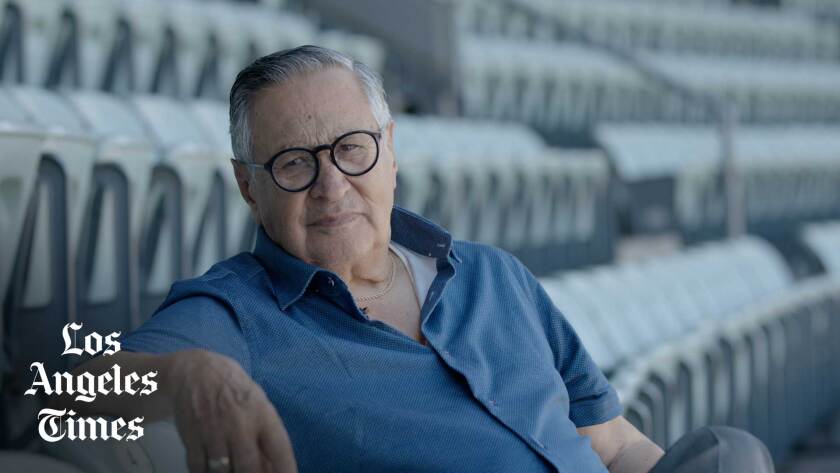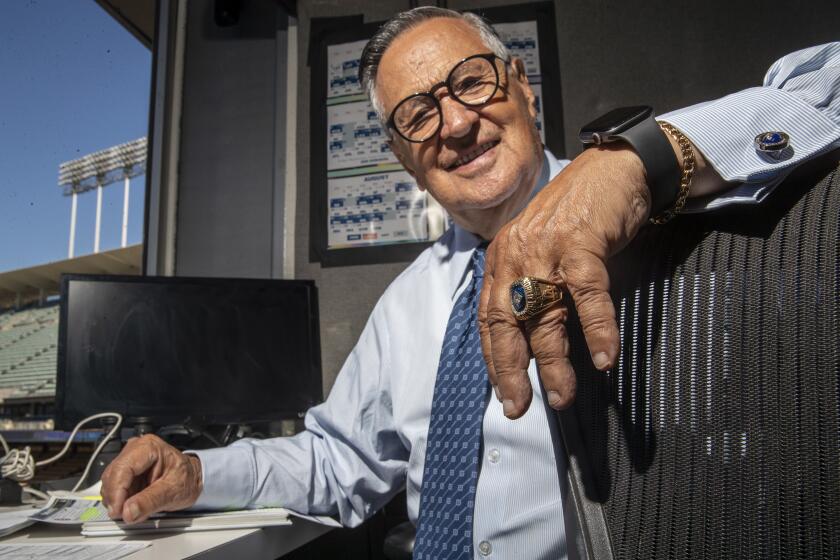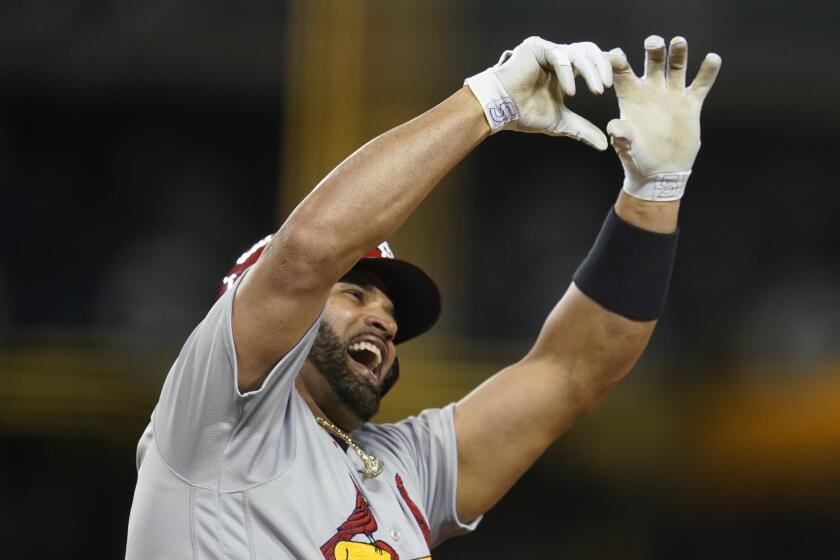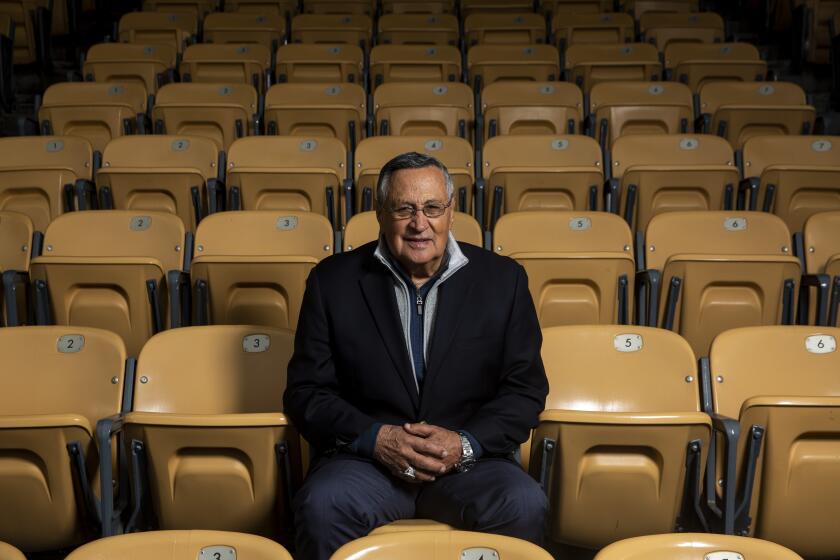- Share via
- Share via
Last week, before a game against the Arizona Diamondbacks, the Dodgers honored employees who have worked for the organization for at least 25 years.
The men and women stood along the first- and third-base lines. There were ushers, ticket-takers, receptionists, a press room operator and a gardener, among others. Players-turned-broadcasters Rick Monday and Fernando Valenzuela were recognized.
Each person was acknowledged in ascending order, based on their years of service. The penultimate employee presented was an usher in his 52nd year working at Dodger Stadium. Several feet away, standing at home plate, was Jaime Jarrín, the franchise’s most senior employee by 12 years.
The cheers amplified when Jarrín, who started calling Dodgers games in 1959 and became the franchise’s Spanish-language voice, was announced. He waved to the crowd, absorbing another applause as his 64-year career approaches the finish line. Jarrín is retiring at the end of this season — whenever the Dodgers’ playoff run ends — as a broadcaster but will continue to represent the organization as a community ambassador. He carries six-plus decades of memories, spanning from Sandy Koufax to Clayton Kershaw, and no regrets.
Legendary Spanish broadcaster Jaime Jarrín, who is retiring after this season, offers up his top Dodgers moments since they came to Los Angeles.
“I feel really good physically, mentally really good,” Jarrín, 86, said in Spanish. “I think I could keep working four or five more years, but no, I think this is the precise moment.”
Jarrín estimates he has called between 10,000 and 12,000 Dodgers games. He worked nearly 4,000 straight from 1962 until 1984 when he ended the streak to lead Spanish-language radio coverage and production for the Olympics in Los Angeles. He received the highest civilian honor in his native Ecuador in 1992. He is one of three Spanish-language broadcasters in the National Baseball Hall of Fame, enshrined in 1998. He was inducted into the Dodgers’ Ring of Honor in 2018.
Along the way, Jarrín became the treasured voice for the Dodgers’ Latino fanbase — the Spanish-language counterpart to Vin Scully — and a respected colleague in the industry in any language. In the end, he is one of the few living links from the organization’s early days in Los Angeles, an invaluable connection to the past that covers Dodger Stadium’s 60-year existence.
“It’s kind of like Babe Ruth and Lou Gehrig,” Dodgers historian Mark Langill said. “You read about how Gehrig was sometimes considered in the shadow of Babe Ruth. And I don’t think Jaime is in the shadow of anybody. Those that have been listening to Jaime for the last 64 years, he’s their version of Vin Scully.”
His career will be celebrated Saturday before the Dodgers play the Colorado Rockies, capping off a season of tributes.
“The love I feel here is overwhelming,” Jarrín said. “I didn’t expect that much.”
“The O’Malleys had a vision for this ballpark and then the surroundings and the demographics. Jaime was a perfect conduit to carry that.”
— Dodgers broadcaster José Mota
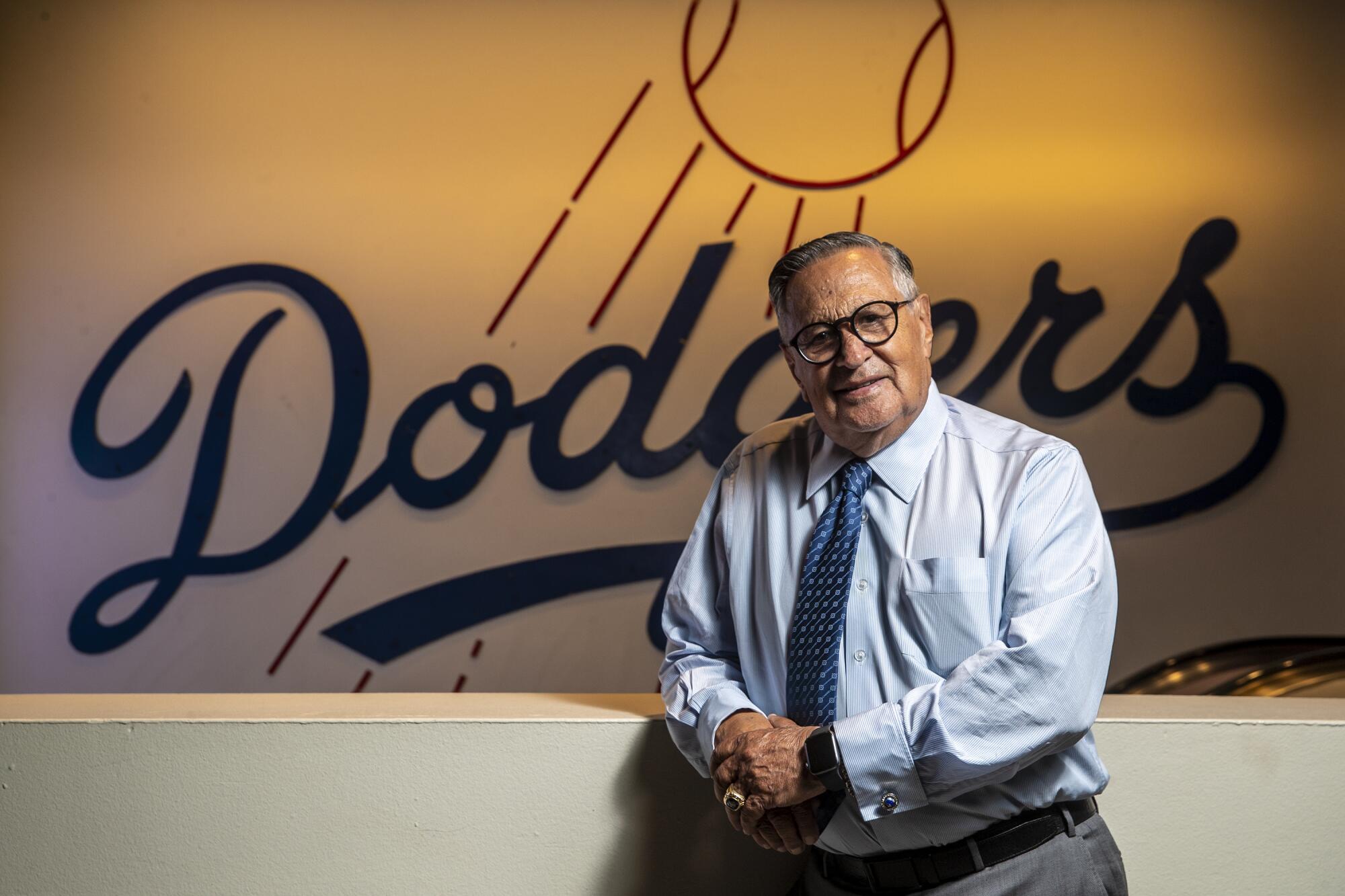
This year alone, Scully, Tommy Davis, Mike Brito and Maury Wills have died. Don Newcombe, Don Sutton and Tommy Lasorda preceded them over the previous three years. Jarrín knew all those luminaries, some more intimately than others, and has stories stockpiled in his memory bank.
“Sometimes I think, ‘Why so much fortune for me, having lived longer than all of them?’ ” Jarrín said.
The start to Jarrín’s career in baseball was unorthodox. He immigrated from Ecuador in 1955 at age 20. He joined KWKW-AM (1330), the only Spanish-language radio station in L.A. at the time, after working as a cafeteria busboy while studying English for a year. Then, in 1959, Dodgers owner Walter O’Malley hired him to work alongside René Cárdenas, the first full-time Spanish-language play-by-play voice in Major League Baseball history.
Jarrín knew little about baseball; he went to his first game in 1958 as a fan.
“I’ve always said I’m a play-by-play [broadcaster],” Jarrín said. “I never played baseball, and I can’t invade an analyst’s turf. I analyze very little, almost nothing. I’m there to report what’s happening. My job is to narrate the game, describe what’s happening, give some color to the broadcast so the people don’t get bored and let the analyst do his job. I never consider myself a know-it-all. And that I think has been part of my success.”
Jarrín and Cárdenas initially rebroadcast games from Scully’s calls before the organization, with a push from Scully, sent them on the road. For some games, they were relegated to work from the stands.
When Cárdenas left for the Houston Colt .45s before the 1962 season, the year Dodger Stadium opened, Jarrín was paired with Jose Garcia. The partnership lasted until Garcia died and Rudy Hoyos, a Mexican American actor, joined the booth in 1973. It was then, Jarrín said, after 15 years, that he felt like the No. 1 person in the booth.
“The O’Malleys had a vision for this ballpark and then the surroundings and the demographics,” Dodgers broadcaster José Mota said. “Jaime was a perfect conduit to carry that.”
As the years passed, more and more teams established Spanish-language broadcasts with the Dodgers setting the standard.
“It’s been a pleasure to open doors for other organizations that follow the Dodgers’ path and respect the power of the Latino community,” Jarrín said. “The Dodgers’ Latino fanbase is the envy of the other organizations, but the Dodgers have known how to cultivate that segment of the population. They haven’t faltered and now they’re a huge part of the Dodgers.”
Jarrín credits Scully, who died in August, for being “the architect” of his career. Scully, Jarrín recalled, would relay the weather and ambience from road games when the Spanish-language team didn’t travel. And when Jarrín started traveling, Scully was a confidant.
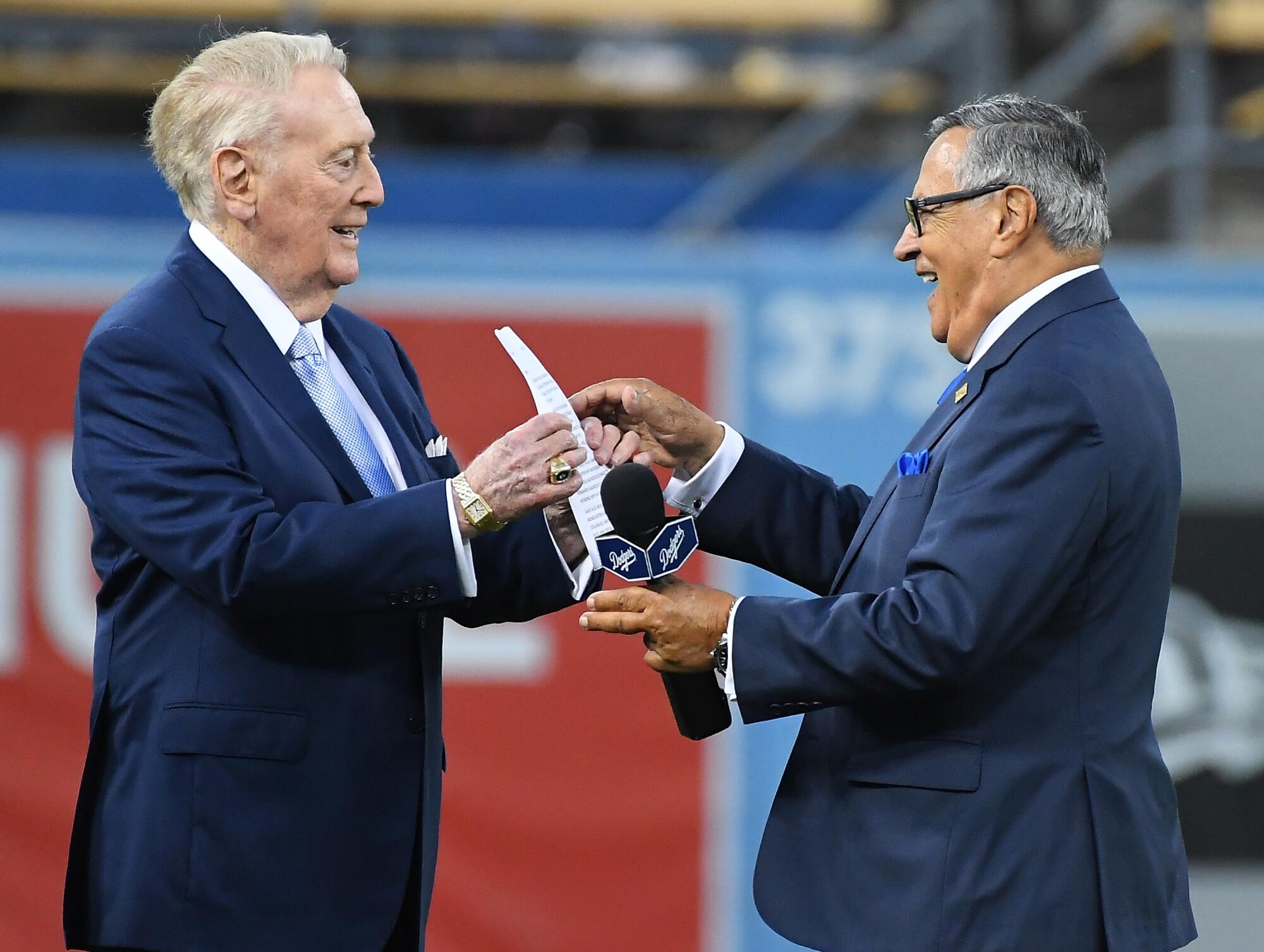
Scully drove Jarrín to the ballpark in San Francisco in his rental car. He took Jarrín to the best restaurants in New York and Chicago. He fed him advice and knowledge.
“My friendship with Vin Scully was really the apex of my experiences in baseball,” Jarrín said.
The best memories on the job, Jarrín said, were cultivated during those days on the road. He recalled the times Lasorda would call him in the wee hours of the morning, after a tough loss, to accompany him on long walks. The two would stroll through the streets of National League cities at dawn.
One time, in the late 1980s, Lasorda brought him to a high-end clothing store in Philadelphia and told him to pick anything he wanted. Jarrín was hesitant but relented. He chose a beige suit.
“It was very nice,” he said.
In Montreal, Jarrín and Dusty Baker shopped at the same clothing store together every time they were in the city. In Atlanta, Jarrín cozied up to the owner of a massive shoe store. He would take players with him, especially Latinos, to buy shoes every year because the store owner would give them great deals. Then there was the time Eric Davis spent $28,000 during one visit.
When Albert Pujols hit his 700th home run, the powerful feat became a special moment of pride for Latinos, particularly Dominicans, who cherish baseball.
“I think he found like 15 pairs at $1,500 apiece,” Jarrín said.
All the while, Jarrín kept to his roots as a newsman as KWKW-AM’s news director in the early years.
He covered President John F. Kennedy’s memorial services. He was there at Palacio de Bellas Artes when Gustavo Díaz Ordaz became Mexico’s president in 1964. He covered the Chicano Moratorium in August 1970 and was across the street from where Los Angeles Times journalist Ruben Salazar was killed by a deputy’s tear gas canister. In 1979, he chronicled Pope John Paul II’s first visit to the United States.
Jarrín was so respected by his listeners that when a man hijacked a Frontier Airlines plane to Los Angeles in 1972, he would meet with only Jarrín before releasing the 56 hostages.
“The radio was the way to connect with the Mexican community in Los Angeles,” Jarrín said. “And so I went there. That, above all, helped establish myself within the community.”
Jarrín also kept busy with more than 30 world championship boxing fights, including the Thrilla in Manila between Muhammad Ali and Joe Frazier in 1975. The wide-ranging work produced other opportunities. He served as spokesman for 25 years with Sears and 18 years with Chevrolet, but his most famous role came as the voice of Los Defensores, a law firm in Los Angeles.
“I’m going to miss the baseball because I now have baseball in my veins, in my blood. But I’m a very practical person. I don’t want to need a walker to move around in my final years.”
— Dodgers broadcaster Jaime Jarrín on his impending retirement
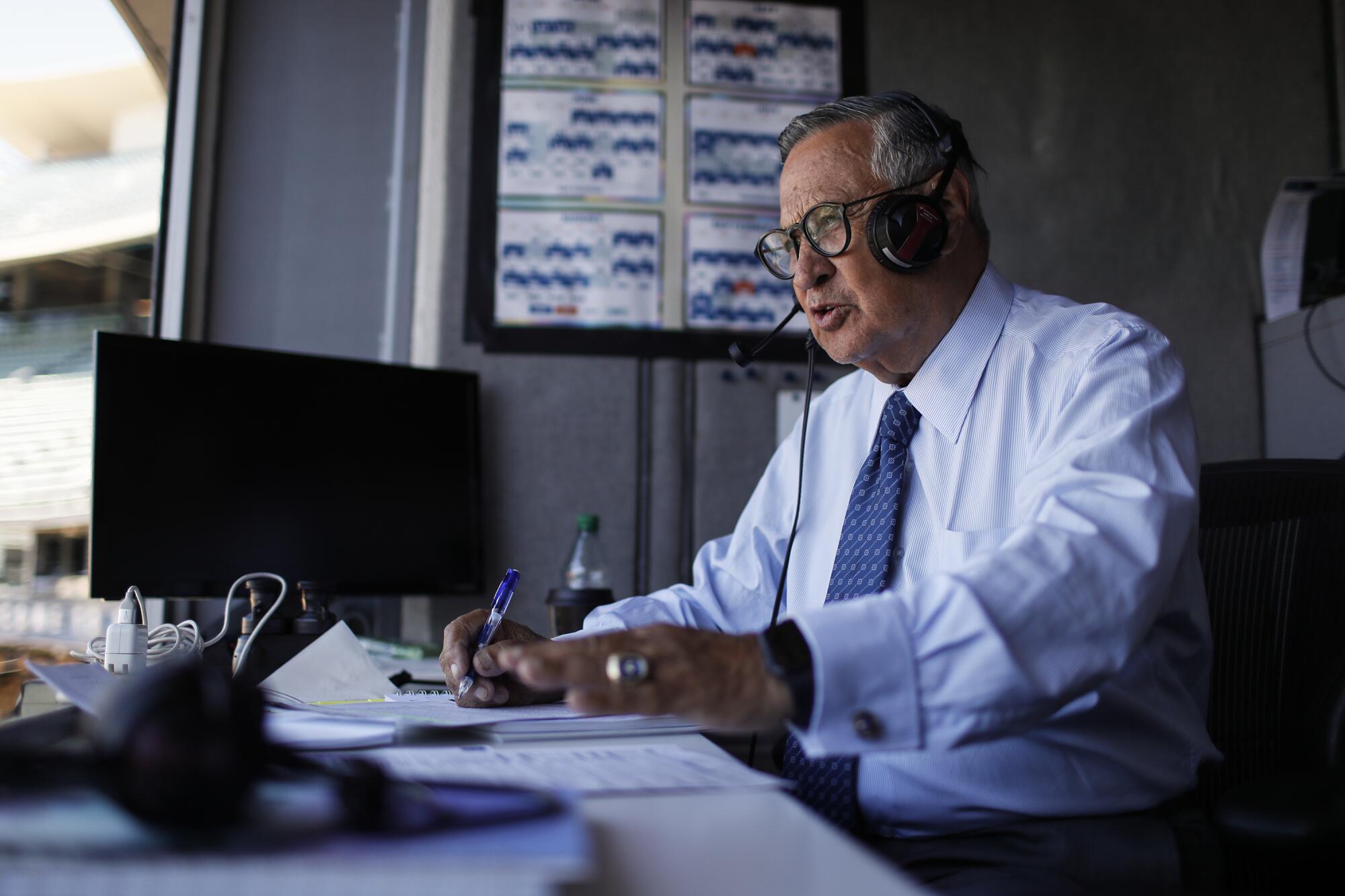
What began as a one-year contract blossomed into a 34-year — and still active — partnership. The commercials featuring Jarrín became ubiquitous on Spanish-language television in the area; if Latinos didn’t know Jarrín for his Dodgers work, they knew him as the man with Los Defensores. Jarrín’s eldest son, Jorge, is also a spokesman for Los Defensores and he worked with his father on the broadcast from 2015 through 2020.
“All that, I believe,” Jarrín said, “comes from me trying to be a responsible person in my job, in my behavior, and identifying with the community.”
Jarrín didn’t reach the American mainstream until 1981 when he served as Valenzuela’s primary interpreter during the left-hander’s historic rookie season. That October, the Dodgers won their fourth World Series in Los Angeles — all with Jarrín in the booth.
“It’s like Jaime was discovered,” Langill said. “But he had been around for so long. Jaime was always there for that Spanish-speaking ballplayer and then suddenly the demographics change in the ballpark, but the players didn’t change and Jaime didn’t change.”
The Dodgers added another title in 1988 behind Orel Hershiser’s rubber arm. Hershiser is a reason why Jarrín was wearing that championship ring last Friday. He finds the piece of jewelry not too gaudy, not too heavy, and treasures his friendship with Hershiser, someone he calls a brother.
“I wear this ring with a lot of pride,” said Jarrín, who called the Dodgers’ last championship in 2020 from an empty Dodger Stadium with his son.
The friendship between pitcher and broadcaster began during Hershiser’s playing days and blossomed in recent years with frequent family lunches and dinners.
“I’ve really appreciated his guidance and mentorship,” Hershiser said.
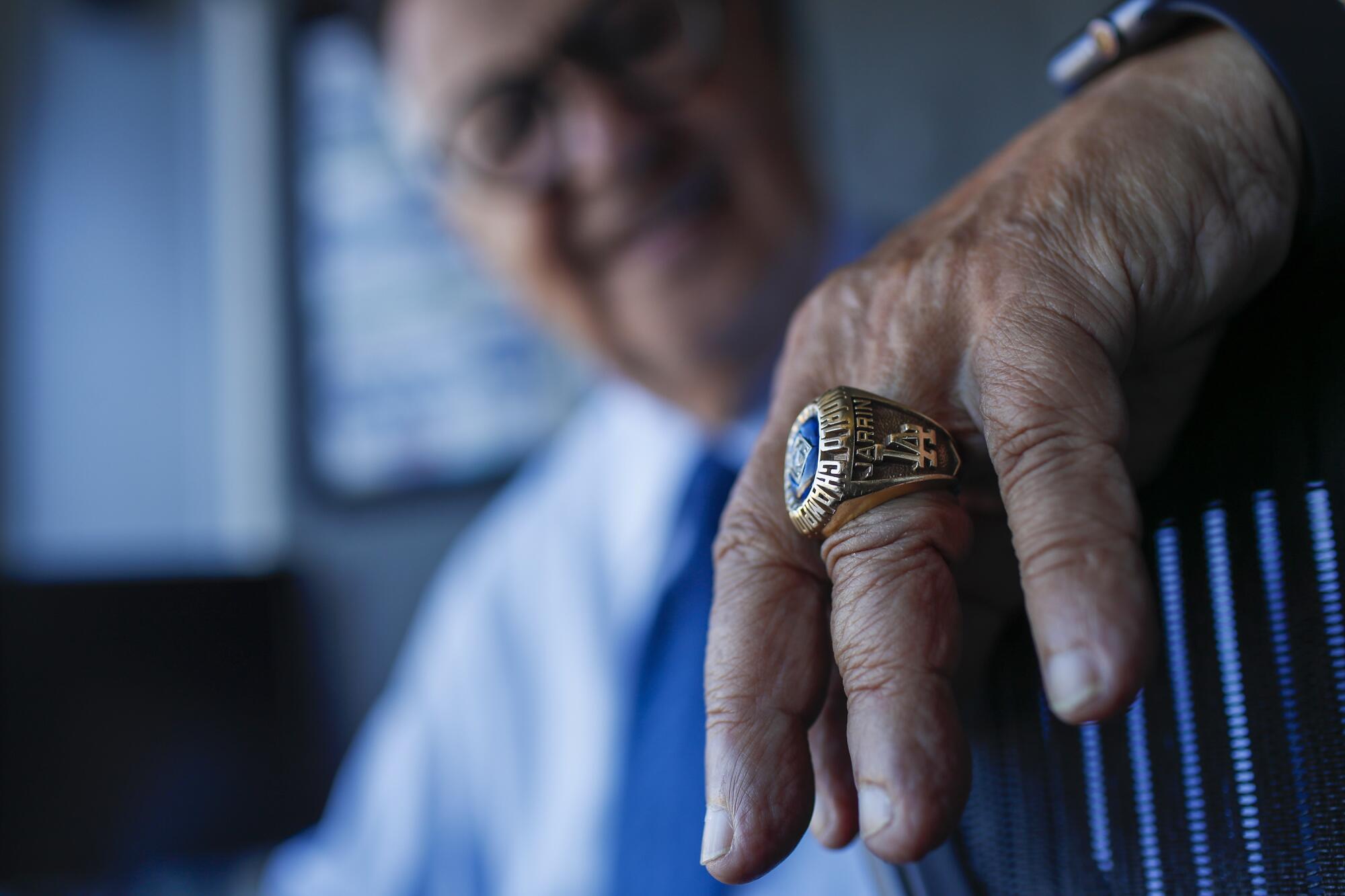
Mota met Jarrín as a boy in the 1970s while his father, Manny, played for the Dodgers. He said Jarrín invited him to the booth during games to listen to the broadcast. Occasionally, Manny Mota interviewed opposing players — in Spanish and English — on the field for Jarrín.
“To me, working with Jaime has been almost like a dream come true,” said Mota, who joined the Dodgers’ Spanish-language broadcast team this season.
Mota called this season’s home run derby and All-Star Game in Los Angeles with Jarrín. It was Jarrín’s 31st All-Star Game to go with the three perfect games, 22 no-hitters and 30 World Series on his résumé. Another World Series is possible.
Jarrín hasn’t been with the Dodgers on the road since the start of the pandemic in 2020, but he is scheduled to follow the championship favorites throughout the postseason. He last joined the club on the road in 2019, when he initially planned on cutting back on his schedule before his wife of 65 years, Blanca, died during spring training in February. He decided to work the entire 162-game schedule, plus the postseason, in part to dull the pain.
Arellano: A hearty thank you to Dodgers legend Jaime Jarrín. ‘He made me believe that I belong’
When Los Angeles Dodgers Spanish-language broadcaster Jaime Jarrín announced this week that he would retire in 2022 after a 64-year career, the first thing Jose de Jesus Ortiz did was look through his phone.
They raised three boys together and mourned the loss of their middle son, Jimmy, to a brain aneurysm in 1988. Two years later, Jarrín nearly died in a car accident during spring training in Florida. A head-on collision with a speeding pickup truck left him with a ruptured spleen, collapsed lungs, three broken ribs and a ravaged liver. He spent four months in a hospital and was back in the booth for the 1991 season.
That was the longest Jarrín has gone without calling Dodgers games since 1958. That’ll change in 2023, when he plans to focus on his foundation, which grants college scholarships to Latino students, and traveling.
Jarrín wants to visit every part of the U.S., from Wyoming to Maine to the southernmost part of Florida, with his two sons and daughter-in-law. He recently spent two weeks in Austria, Germany and Switzerland with a group of writers from New York. They visited large cities and small towns. He was enamored by the Swiss Alps.
“I know the Andes really well, but the Alps are impressionable,” Jarrín said. “I loved Switzerland.”
Jarrín returned to Los Angeles to a bombardment of interview requests; he had just finished one with CBS last Friday before finding solitude in a conference room at Dodger Stadium. A few hours later, Jarrín was in the booth for another historic moment, delivering his signature call for Albert Pujols’ 699th home run.
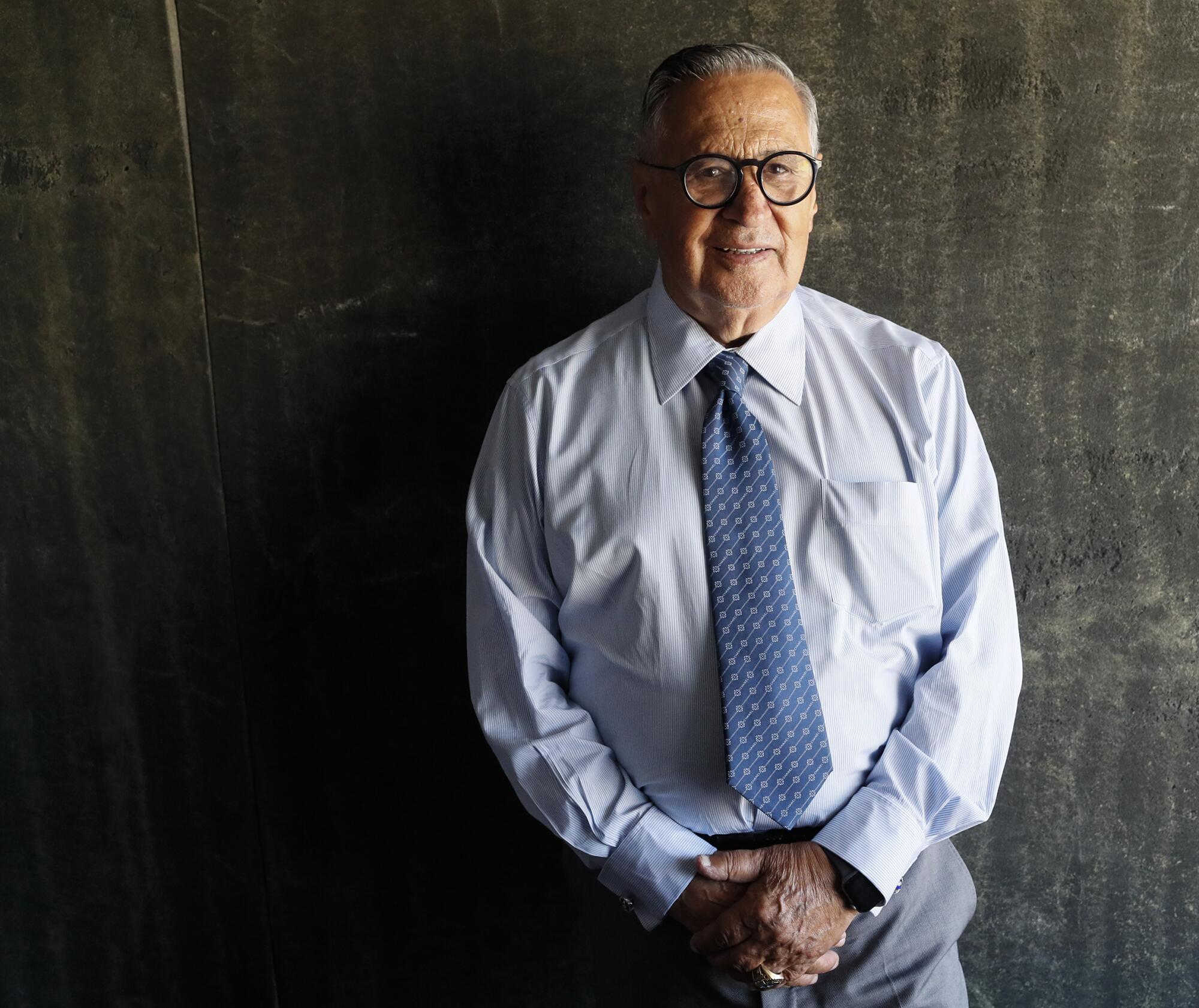
“Batazo profundo,” Jarrín narrated, his voice rising with the blast. “La pelota se va, se va, se va y despídala con un beso!”
Pepe Yñiguez was on the microphone with Valenzuela the next inning for Pujols’ 700th home run, a milestone only three others have reached, but Jarrín will have more opportunities to narrate memories over the next month.
Then, finally, after 64 years, one of the final connections to the Dodgers’ first years in Los Angeles, one that has been around longer than Dodger Stadium itself, will hang up his microphone.
“I’m going to miss the baseball because I now have baseball in my veins, in my blood,” Jarrín said. “But I’m a very practical person. I don’t want to need a walker to move around in my final years. It’s been an extraordinary career. It’s the right time.”
More to Read
Are you a true-blue fan?
Get our Dodgers Dugout newsletter for insights, news and much more.
You may occasionally receive promotional content from the Los Angeles Times.
